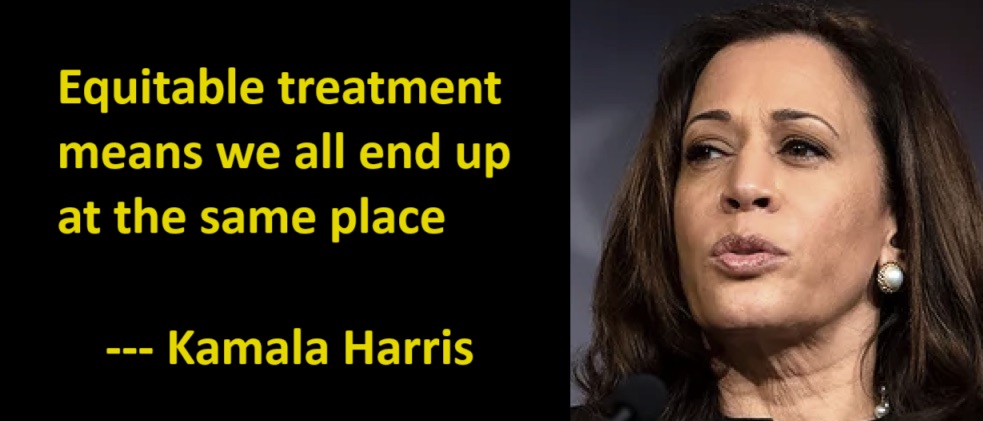What’s the most radical part of Kamala Harris’ agenda?

|
I’m tempted to say it’s what she has said about wanting the Marxist notion of “equality of outcomes.” But I suspect (or hope!) that’s just empty campaign rhetoric. If we look at the specific ideas she has proposed, she was definitely radical when she rain in 2020, embracing crazy ideas like the Green New Deal and Medicare for All.
For the most part, she has been more cautious this year. She has a leftist agenda, but it’s mostly focused on incremental statism, such as partial price controls, more redistribution, and higher corporate tax rates.
But she has one idea that is breathtakingly bad. She wants the IRS to tax unrealized capital gains, which means that if you own an asset that increases in value from one year to the next, the government would tax that difference.
I opined about the Harris proposal for the U.K.-based Telegraph newspaper. I started by warning that both presidential candidates have been furiously trying to buy votes (last month, I wrote that this is America’s “Santa Claus election”).
Election years can be dangerous because politicians have extra incentive to push bad policies. Donald Trump has floated all sorts of gimmicky tax cuts, such as ending taxes on tips, Social Security, and overtime pay. …Needless to say, Trump has not proposed a single penny of savings on the spending side of the budget. To the contrary, he actually wants to further expand the burden of government. …What about Kamala Harris? She’s also playing Santa Claus, having proposed several trillion dollars of additional redistribution spending. She intends to finance some of that new spending with various class-warfare taxes such as higher personal tax rates and higher business tax rates.
I then explain that one of her tax increases is the radical scheme to tax gains that exist only on paper.
…Harris is also proposing to impose a 25 per cent tax on unrealised capital gains. If an affected taxpayer owns an asset that increases in value from Year 1 to Year 2, that “gain” would be subject to the 25 per cent tax even though nothing has been sold and the taxpayer doesn’t have any additional money.
I give five reasons why her proposal is absurd.
First, it will reduce investment, which will reduce productivity, which will reduce wages.
…it is bad for workers to impose higher taxes on investment and entrepreneurship. The Veep’s proposed tax on unrealised gains would exacerbate the US tax code’s bias against saving and investment… This means less money being set aside to finance productivity-enhancing inventions, innovations, and industry.
Second, the plan would dramatically increase the complexity of a tax code that already is a convoluted nightmare:
…the tax would be an administrative nightmare. Taxpayers and the Internal Revenue Service would have to squabble every year over the value of a taxpayer’s assets. …Tax lawyers and accountants are probably salivating at the thought of this plan becoming law.
Third, it is disturbingly close to a punitive wealth tax:
…a tax on unrealised capital gains could be viewed as a backdoor wealth tax. …The only difference is that it would be a tax on changes in wealth rather than a tax on the stock of wealth.
Fourth, it is so radical that no other country has made this mistake:
…no nation in the world has ever tried to impose a tax on unrealised gains. Even hard-core Leftist governments such as Venezuela have never contemplated such an intrusive and destructive levy.
Fifth, Harris says only rich taxpayers will be affected, but experience teaches us that it will merely be a matter of time before others are hit as well.
…supporters of the tax claim that it would only apply to…less than 1 per cent of the population. That may sound reassuring to ordinary voters … until they realise that the first income tax back in 1913 also applied to less than 1 per cent of households. Yet that “tax on the rich” eventually morphed into the monstrous internal revenue code.
The bottom line is that there should not be any capital gains tax. It’s a very destructive form of double taxation. As such, the Harris plan to expand this destructive levy is a “nutty idea.”
P.S. A lot of my lefty friends are upset that the Washington Post is not endorsing Harris. My personal theory is that the owner, Jeff Bezos, is very aware that the Vice President’s plan would be very bad for his personal finances and (since we already know he seeks to protect his money) he has rationally responded.
P.P.S. One of the worst features of the capital gains tax is that there’s no protection against inflation, so politicians win from bad monetary policy. That unfair policy will be exacerbated by the Harris proposal.
No comments:
Post a Comment